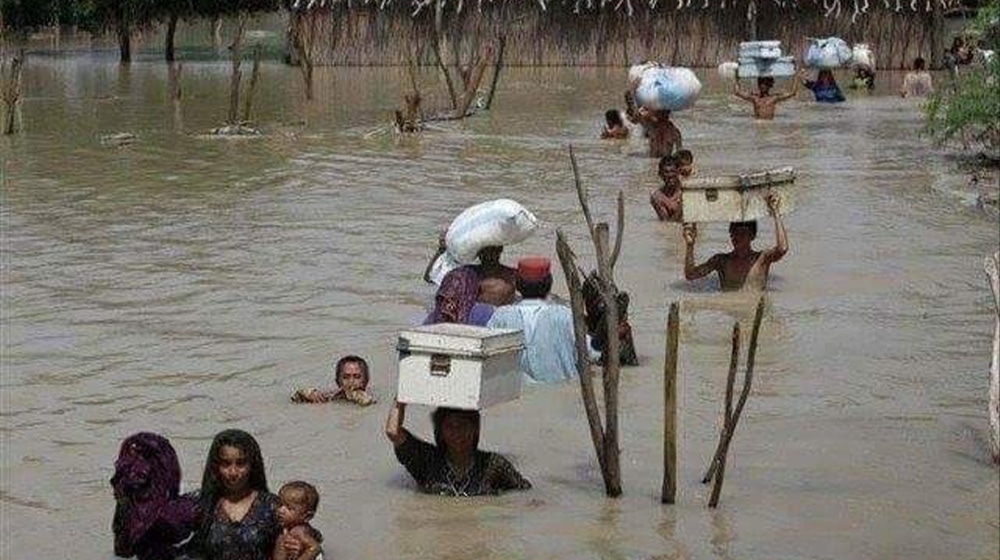Pakistan is currently experiencing the forefront of the detrimental effects of worldwide climate change. The apparent preoccupation of political leaders with their individual agendas is indicative of their limited awareness and disregard for the pressing peril confronting the nation.
Climate specialists have consistently cautioned that Pakistan would be among the nations most impacted by climate change, and recent occurrences have corroborated these apprehensions.
Visible Effects
The effects of global warming have become increasingly apparent in Pakistan. Rising air temperatures have led to a higher capacity for moisture, resulting in torrential rainfall. In 2022, the country experienced four times more precipitation than the average of the last 30 years, causing catastrophic floods that took a heavy toll on both lives and infrastructure.
Monsoon Nightmare
The monsoon season, which is usually a respite from the intense summer temperatures, transformed into an unparalleled nightmare. Last year, by the conclusion of August, Karachi, the most populous city in Pakistan, had documented an astounding 48 inches of precipitation, in contrast to its customary yearly mean of under 10 inches.
Dire Consequences
The consequences were dire. The floods claimed the lives of 1,300 humans and affected over 33 million citizens, roughly 13% of the population of the country. Entire communities were displaced, with makeshift camps struggling to accommodate the displaced individuals. The destruction of 2,200 miles of roads hindered rescue and relief efforts, while 888 health facilities were destroyed, exacerbating the risk of disease outbreaks. Mosquito-borne illnesses such as dengue fever and malaria posed a further threat as standing water provided breeding grounds for these vectors.
Link Between Climate Change and Extreme Weather
Climate scientists in Pakistan are exploring the relationship between climate change and extreme weather occurrences using a novel technique known as “attribution studies.” They want to establish correlations between climate and meteorological occurrences through these investigations, which will provide vital insights into the influence of global warming on individual events. In the case of Pakistan, preliminary studies show that climate change has greatly exacerbated heat waves and heavy rains. While catastrophic weather events sometimes occur naturally, the imprints of human-induced warming were clear, enhancing their severity.
Poor Response from Global Community
Pakistan’s plight serves as a sobering reminder of the consequences of climate change. As Frederick Otto, lead author of a study conducted by World Weather Attribution, explains, “The country might have experienced disastrously high rainfall this year even without global warming. But it was worse because of climate change.” The situation in Pakistan underscores the urgent need for international cooperation and support to address the challenges faced by vulnerable nations.
Unfortunately, the response has not been sufficient from the global community. Many countries including Denmark have committed to bearing compensation for the adverse impacts of climate change in developing countries. But these prosperous nations are unwilling to fully acknowledge their irresponsibility and capability. The adverse impacts of climate change are disproportionately affecting the developing world, including Pakistan, primarily attributed to the emissions of prosperous countries. Ahsan Iqbal, the Minister for Planning and Development in Pakistan, has underscored global solidarity’s significance and called upon developed nations to take concrete measures and extend substantial support.
Not Just a Humanitarian Crisis
Climate change has effects that go well beyond immediate humanitarian crises. A decimated agricultural economy has resulted in the deaths of hundreds of thousands of farm animals, as well as crop destruction. There are staggering economic repercussions, with the government estimating $10 billion in recovery costs. As climate change continues to wreak havoc, vulnerable nations like Pakistan desperately require greater financial resources and support to rebuild and adapt to the challenges ahead.
Now or Never
It is crucial that developed nations pay close attention to the current situation in Pakistan and respond promptly. It is imperative for the global community to acknowledge the significance of climate justice and allocate adequate financial resources to support nations that are prone to its adverse effects. The organizations like World Weather Attribution, which utilizes Pakistan as an example, hold the potential to shift the sentiment in developed nations in their work. By highlighting the direct links between climate change and extreme weather events, these studies provide compelling evidence that demands action.
The entire world should take note of Pakistan’s fight against climate change. Extreme weather events, expanded precipitation, and increasing temperatures have an impact worldwide. They affect millions of people’s lives and livelihoods globally and cut over national boundaries. Therefore, it is essential that affluent nations accept historical responsibility for greenhouse gas emissions, act swiftly to reduce climate change and aid vulnerable nations.
Not About the Aid
Apart from monetary aid, technology transfer, capacity building, and knowledge sharing are crucial for facilitating climate adaptation in developing countries such as Pakistan. The implementation of climate-resilient infrastructure, early warning systems, and sustainable agriculture can effectively alleviate the consequences of forthcoming extreme weather phenomena. The imperative for fostering a sustainable and resilient future for all necessitates collaborative endeavour, underpinned by a shared sense of global solidarity.
World Should Learn
The experience of Pakistan ought to be regarded as a clear and urgent message for governments, policymakers, and individuals globally. The phenomenon of climate change is not a prospective hazard, but rather a current actuality, and its repercussions are progressively intensifying with the passage of time. The current plight of Pakistan and other susceptible nations highlights the pressing need to acknowledge the gravity of the circumstances and promptly implement measures to mitigate the effects of climate change.
What Pakistan Should Do?
There is no time to waste now and an urgent transition to a low-carbon economy is required. We need an immediate reduction in linear economical approaches and adapt circular economy. Prioritizing renewable energy sources and sustainable practices in all aspects of our lives is mandatory. We need collective efforts to encounter this issue. We should transcend political boundaries, and work toward a sustainable and equitable world.
The struggle of Pakistan should be a rallying cry for global climate justice. Through the allocation of resources towards enhancing resilience, adaptation, and sustainable development, it is possible to alleviate the most severe consequences of climate change and establish a more promising future for all countries, including Pakistan.
The global community must take heed of Pakistan’s appeal and take solid action. The future of the planet and the welfare of future generations are at stake. It is imperative that we utilize Pakistan’s adversity as a driving force for significant and positive alterations. Collectively, it is practical to construct a future that is resilient, environmentally conscious, and equitable for every individual.
About the Author:
Sadam Hussain, a Civil Engineering Graduate from NUST






















